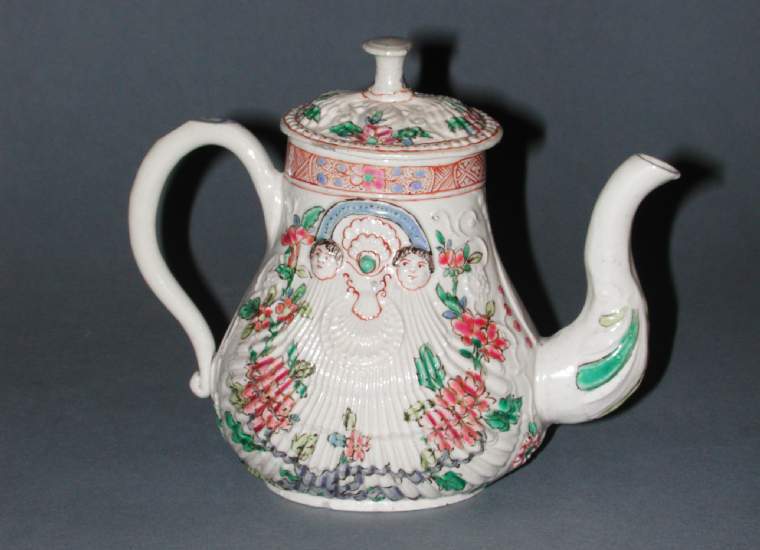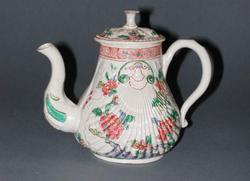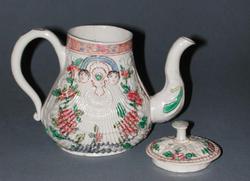Current Location: In storage
Maker(s)
Factory:
Unidentified Staffordshire Pottery
Entities
Categories
Description
Salt-glazed stoneware painted in enamels with floral decoration.
White salt-glazed stoneware painted overglaze in coloured enamels. The pear-shaped teapot has an s-curved spout and loop handle. The body has integral relief decoration in the form of a different shell and scroll pattern on either side of the teapot. On one side of the teapot, the shell pattern includes two masks. The spout and lid are decorated with relief shells and scrolls. Painted in enamels on the sides of the teapot are flowering branches. Four flowers are painted on the lid. The flowers are pinkish-red with green and yellow-green leaves; the branches from which they grow are blue and blue-grey. Parts of the relief on the body and spout are picked out in red, black, green and blue and there is a painted trellis-pattern border around the top of the teapot.
Notes
History note: Provenance unidentified before Galton’s shop, Christchurch, Hampshire (now Dorset), where it was purchased for £23 on 12 November 1918 by Mrs Dickson of Bournemouth on behalf of Dr J.W.L. Glaisher, FRS, Trinity College, Cambridge
Legal notes
Dr J.W.L. Glaisher Bequest.
Measurements and weight
Width: 15.4 cm
Acquisition and important dates
Method of acquisition: Bequeathed
(1928-12-07)
by
Glaisher, J. W. L., Dr
Dating
18th Century, Mid
George II
Production date:
circa
AD 1750
Note
Several different models of shell teapot were produced by Staffordshire potters at this time. Shells were a common decorative motif in the fashionable rococo style of the mid-18th century.
The teapot is painted in imitation of Chinese famille rose porcelain; the name ‘famille rose’ was coined in the 19th century to describe a particular style of decoration used on porcelain produced in China in the 18th century for the Western market. The style was characterised by soft colours, including notably a rose pink, like the pink used for the flowers here. Porcelain from China was expensive and available only to the wealthy upper classes in England. Staffordshire potters therefore often produced objects in salt-glazed stoneware, a less expensive material, for the middle classes of the 18th century, who wanted to emulate the habits of the gentry, including the elaborate social ritual of tea-drinking, but could not afford Oriental porcelain teawares.
School or Style
Rococo
famille rose
Components of the work
Body Without Lid
Height 10.4 cm
Body With Lid
Height 12.5 cm
Body
Materials used in production
white
Stoneware
Enamels
Salt-glaze
Techniques used in production
Painting overglaze
Salt-glazing
Inscription or legends present
Inscription present: stick-on white octagonal paper collector’s label with blue-border; now badly worn and only partially legible
- Text: “4624. Coloured salt-glazed pictorial teapot… [illegible] …b. in Chri… [illegible]”
- Location: On base
- Method of creation: Handwritten in black ink
- Type: Label
References and bibliographic entries
Identification numbers
Accession number: C.597 & A-1928
Primary reference Number: 75607
Old catalogue number: 4642
Stable URI
Audit data
Created: Saturday 6 August 2011
Updated: Tuesday 30 April 2024
Last processed: Tuesday 15 July 2025
Associated departments & institutions
Owner or interested party:
The Fitzwilliam Museum
Associated department:
Applied Arts






